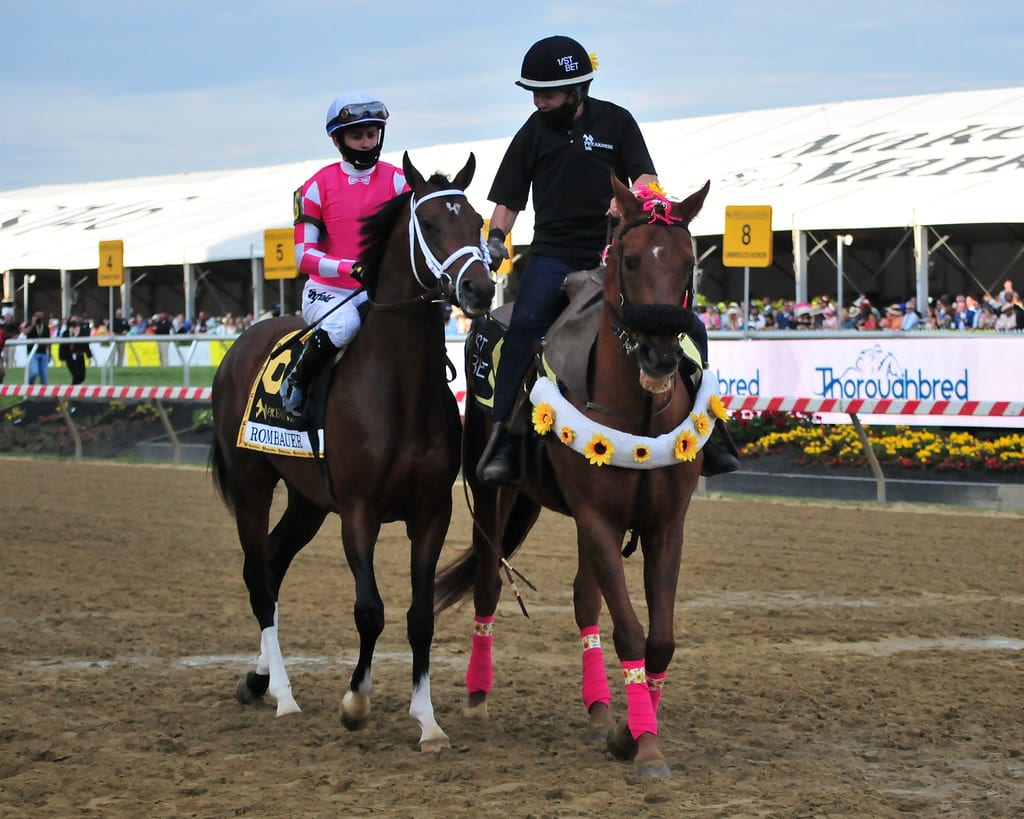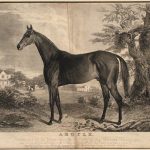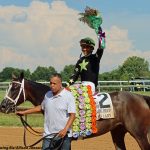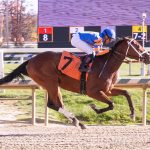MARYLAND RACING: STORIES THAT MATTERED IN 2021

It was a year in which we (sort of) learned to live with covid, didn’t really enjoy living with Bob Baffert, and couldn’t live at all with a troubled track. It was a year in which the Preakness moved back towards normalcy, despite Bob Baffert’s best efforts, and in which old friend Timonium returned to the calendar.
There was controversy aplenty, and some locals – human and equine – found greener pastures and made very good, indeed. Here are some of the top stories of the year in Maryland racing:
7. Timonium returns
It wouldn’t be summer in Maryland without racing at Timonium during the State Fair.
Except in 2020, when there was neither a State Fair nor racing at the Big T.
But the Big T returned in 2021 with its typical seven-day stand, this year punctuated by the first running of the $113,000 Timonium Juvenile Stakes. That went to the Kenny Cox-trained Cynergy’s Star in a 6-1 upset.
Meet leaders included jockey J. D. Acosta, with 10 wins, and trainer Claudio Gonzalez, with six. Though several horses ran twice during the brief stand, none of them won twice.
6. GREENER PASTURES
Sal Sinatra, head man at the Maryland Jockey Club since 2014, left his post in June to become president of Equibase Company LLC.
Equibase is a partnership between subsidiaries of The Jockey Club and the Thoroughbred Racing Associations of North America and serves as the Thoroughbred industry’s official database.
During Sinatra’s tenure, handle on MJC racing grew significantly and millions of dollars of improvements, primarily at Laurel Park, were undertaken.
Speaking of greener pastures, another Maryland stalwart who headed elsewhere was jockey Trevor McCarthy. McCarthy, who began his career racing primarily in Maryland and Delaware, shifted his tack to California this past spring, moving there with new wife and fellow jockey Katie Davis. The couple, along with their newborn daughter, have since come back East, with McCarthy now riding at Aqueduct.
- Spa Selections 2025: Saratoga Picks July 11
 Picks and analysis for today’s key races from Saratoga.
Picks and analysis for today’s key races from Saratoga.
5. IN COMMISSION
Beyond issues with the Laurel track surface and Bob Baffert, the Maryland Racing Commission had a busy year, with more controversy than it probably wanted.
In February 2021, the endless case of the 2020 Geisha Stakes, which took place January 18 of that year – that’s before Covid-19 was even a thing – generated a scathing court decision, in which Judge Lenore Gelfman sent the case back to the Commission for reconsideration.
In the Geisha, Anna’s Bandit, trained by Jerry Robb, finished second behind Artful Splatter. Robb appealed the race to the Commission, claiming winner Artful Splatter should have been disqualified for interfering with his runner. The Commission upheld the stewards’ decision not to disqualify Artful Splatter.
But on appeal to the circuit court, Robb found surer purchase. The Commission’s hearing, Gelfman wrote, “did not adequately protect Petitioner against the deprivation of one of his most essential and foundational rights,” that being the right to a “fair and impartial hearing.”
The Commission, employing somewhat modified hearing procedures, subsequently upheld the stews once again, but the case is not yet over.
Five months later, the Commission surprised some observers when it voted to waive penalties for five Thoroughbreds that had tested positive for Amicar and other adjunct bleeder medications. Several harness horsemen, whose horses had similar positives but whose cases had already been adjudicated, were left out in the cold, however.
In the case of the Thoroughbreds, the penalty for Amicar positives typically involves the disqualification of the horse and the loss of purse earnings. In this case, however, the Commission turned the positives into warnings.
The spate of positives arose after the Commission shifted testing labs, swapping out Truesdail Laboratories for Industrial Laboratories. Truesdail “was probably not” testing for Amicar, Maryland Thoroughbred Horsemen’s Association general counsel Alan Foreman told the Commission.
4. A NORMAL(ISH) PREAKNESS
After a strange 2020, in which the Preakness was the last of the Triple Crown events to run, and did so in October, it was comforting to see the Middle Jewel return to being, you know, in the middle.
After the normal two-day extravaganza was pared down to a one-day event in ’20, the Preakness returned to its normal spot on the calendar – the third Saturday in May – and was preceded by Friday’s Black-Eyed Susan card.
Though covid regulations kept the crowd restricted, it nevertheless felt like an important step towards normalcy. Army Wife took the Black-Eyed Susan, while Rombauer posted the upset in the Preakness, thus dashing the Triple Crown hopes of Medina Spirit and trainer Bob Baffert, speaking of which…
3. AND YET VERY DIFFERENT
No trainer in racing history has been more successful in Triple Crown events than Bob Baffert, so when his Medina Spirit upset the Kentucky Derby, it felt very much like more of the same for a trainer who’s won the Triple Crown twice.
Until it decidedly did not.
Eight days after the Derby, Baffert announced that following the race Medina Spirit had tested positive for the prohibited corticosteroid betamethasone. While that story continues to twist, turn, and drag on, and Baffert’s lawyer Craig Robertson has tried mightily to pull off the best feat of lawyering since Billy Flynn gave ‘em the old razzle-dazzle in Chicago, the Maryland implications were both clearer and more mundane.
Specifically: let Baffert’s horses run? Or bar them?
In the end, the MJC and Baffert agreed that his horses would be permitted to run while being subjected to “rigorous testing and monitoring in addition to that conducted by the Maryland Racing Commission.”
The back-and-forth meant that Black-Eyed Susan and Preakness entries were both pushed back a day before the agreement was hammered out. The concord allowed Baffert’s four weekend runners to take to the track, but it might have been better if they’d stayed in the barn:
- Medina Spirit was a well-beaten third as the 2-1 Preakness favorite.
- Concert Tour, the 7-2 third choice in the Preakness, finished ninth.
- Beautiful Gift, the 2-1 favorite in the Black-Eyed Susan, was beaten over 20 lengths when finishing seventh.
- Hozier, 3-5 in the Sir Barton Stakes, got outgamed by The King Cheek and finished second.
- Argyle and Thoroughbred racing in the 1830s
 Connected to Supreme Court justices and governors, the Maryland-bred Argyle became one of the best horses of the 1830s. His story.
Connected to Supreme Court justices and governors, the Maryland-bred Argyle became one of the best horses of the 1830s. His story.
2. Down and dirty
While the racetrack, like the naked city, is home to millions of stories, it’s pretty rare that the racing strip itself becomes one of them.
That, however, was the case at Laurel Park during 2021. In fact, the condition of Laurel’s dirt course was one of the biggest Maryland racing stories of the year.
Years of horsemen’s concerns finally boiled over in April, forcing the Maryland Jockey Club to end the Laurel meet a couple weeks early and move racing to Pimlico. One bit of good news there: the Federico Tesio Stakes, the last local prep for the Preakness, moved back to its prior home at Old Hilltop for 2021, meaning that the prep race took place over the same track as the big show.
To its credit, the MJC and parent company 1/ST Racing shut down Laurel for an extended period – racing didn’t return there until after the end of the Timonium meet on Labor Day – to undertake an extensive renovation of the track. Unfortunately, problems flared up again in November, with eight horses perishing in a fraught six-week period, leading to another closure.
Here’s hoping those problems are in the rearview mirror in 2022.
1. MARYLAND-BREDS STAR AT BREEDERS’ CUP
No one could claim to be too surprised when Maryland-bred Knicks Go won the Grade 1 Breeders’ Cup Classic in November at Del Mar.
That he was the second Maryland-bred Breeders’ Cup winner of the day? Well, yes, that was something of a stunner.
Knicks Go dominated the Classic. The five-year-old son of Paynter grabbed the lead early and put it on lockdown, cruising home under jockey Joel Rosario to win by nearly three lengths in a sharp 1:59.57 for 1 ¼ miles. The win capped a year in which Knicks Go won five of seven starts, earned more than $7.3 million, and almost assuredly will be Horse of the Year.
Conditioned by Brad Cox, Knicks Go was bred in Maryland by Angie Moore and is out of the Maryland-bred Outflanker mare Kosmo’s Buddy.
Four races prior to Knick’s Go’s tour de force, another Maryland-bred ran ‘em all down in the Sprint. Four-year-old Aloha West didn’t get out of sixth place until the final of the race’s six furlongs, but once he did, he came flying on the outside under Jose Ortiz to nip Dr. Schivel by a runny nose. It was the first stakes win in Aloha West’s career, which didn’t begin until February.
Aloha West is a son of Hard Spun out of the Speightstown mare Island Bound. Trained by Wayne Catalano, he was bred in Maryland by Katy Voss and her partner, the late Bob Manfuso.
Two Maryland-bred Breeders’ Cup winners? That’s a first.
PASSINGS
Among the horsemen and women and others connected to the sport in Maryland and around the region lost during the year:
- Raoul Middleman, who painted the vibrant grandstand murals at Pimlico.
- Richard Golden, owner of Northview Stallion Station;
- Delaware native Rick Porter, who campaigned champions Songbird and Havre de Grace;
- Hall of Fame jockey Sam Boulmetis;
- Auctioneer Steve Dance, who worked with Fasig-Tipton for nearly 50 years;
- Former trainer Richard Delp, brother of Hall of Famer Bud Delp;
- New Jersey trainer John Forbes;
- Maryland owner-breeder Frank P. Wright;
- West Virginia native Sam Huff, who cofounded the West Virginia Breeders’ Classics;
- Mr. Delaware Park himself, Rich Glazier; and
- Pajeen Delp, daughter of Bud Delp and niece of Richard Delp.
LATEST NEWS












